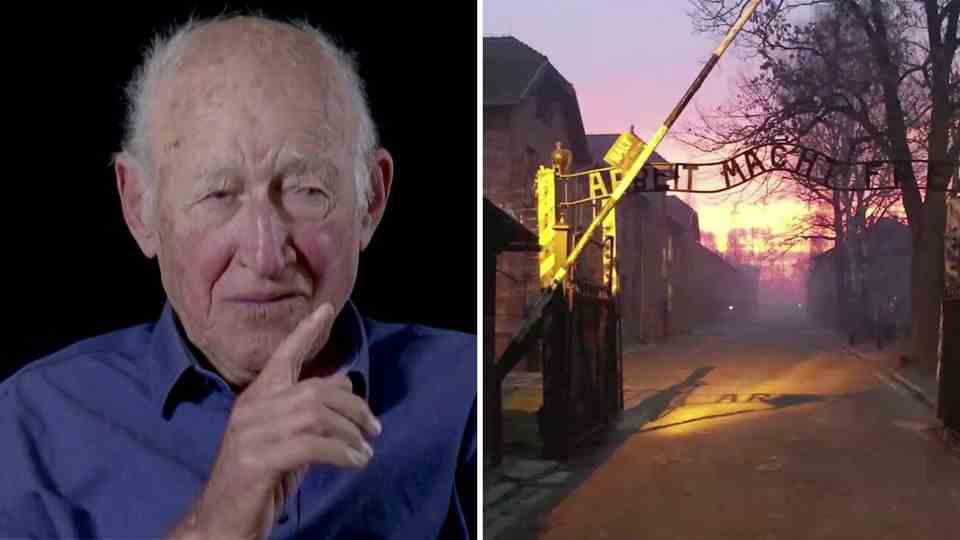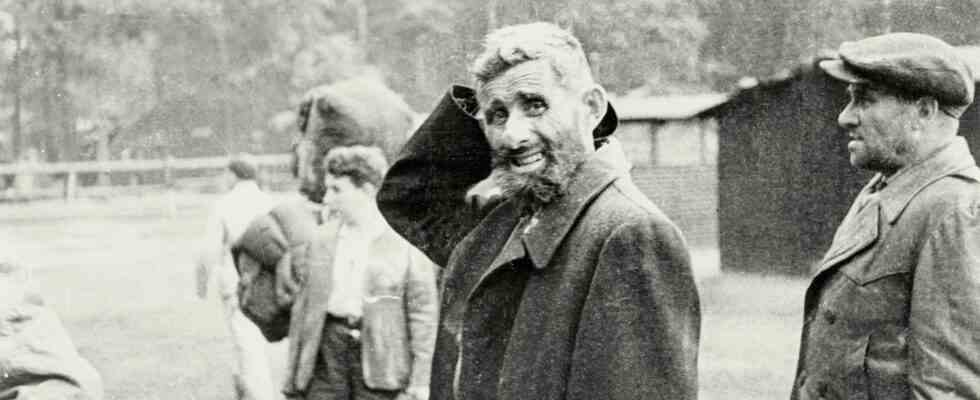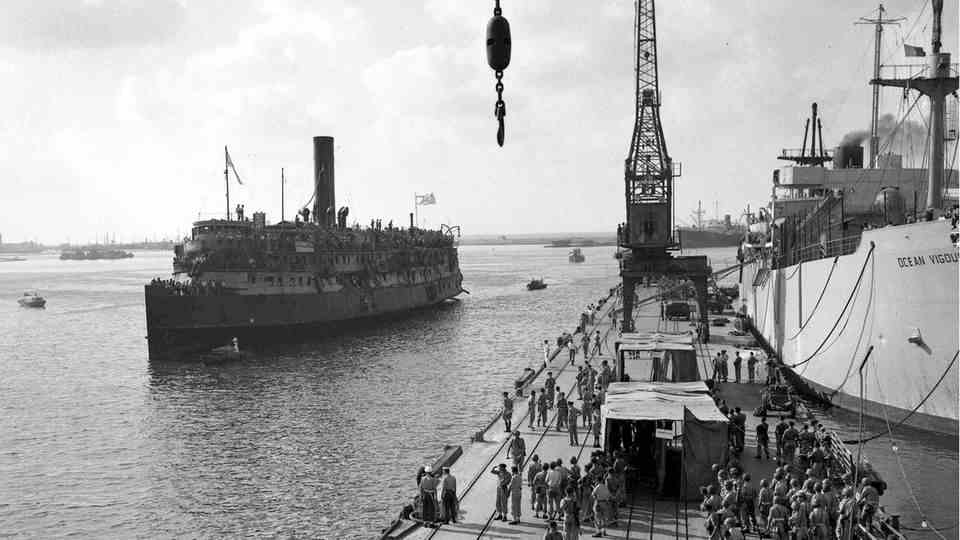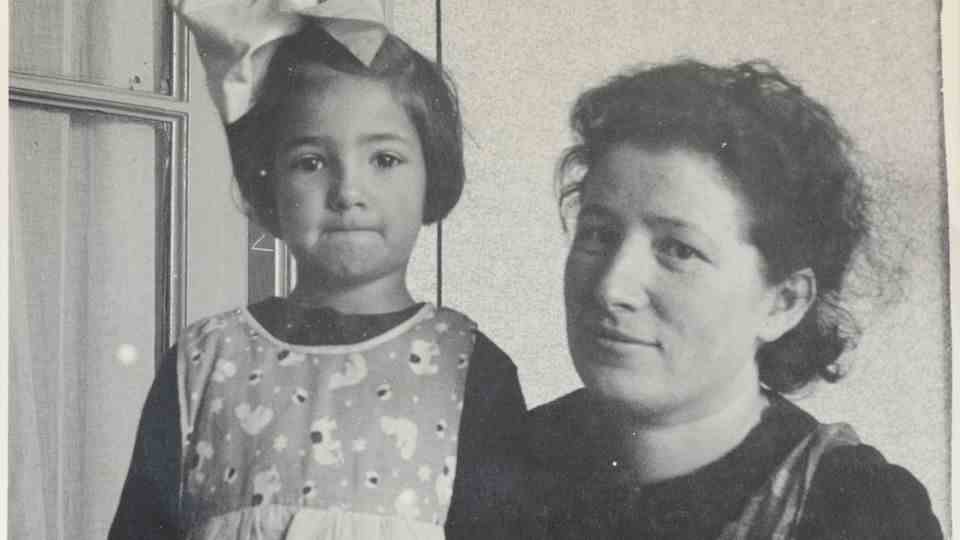“Exodus 1947”
Thousands of Jews tried to get to Palestine in 1947. The British put them in camps – in Germany of all places
Passengers of the “Exodus 1947” in a reception camp in Pöppendorf
© akg-images / Picture Alliance
Palestine was their destination: 75 years ago, more than 4,000 Jews set off for the promised land on board the “Exodus 1947”. But their path led back to camps – because Great Britain used violence to stop the immigrants.
They had survived the greatest horror in human history. And now that Hitler and Nazi Germany had been defeated, they could no longer imagine living in the countries where this horror had been possible. Thousands of Holocaust survivors wanted to turn their backs on Europe after the end of World War II. Many of them were drawn to Palestine, where the Jews historically locate their homeland.
The same happened to the 4,500 Jewish refugees who boarded the ship “President Warfield” on July 11, 1947, exactly 75 years ago. It would later become known as “Exodus from Europe 1947” (short: “Exodus 1947”) – named after the second book of Moses, in which Moses leads the Jewish people out of slavery in Egypt into the promised land. The Jews in the 20th century were also looking for a way to their own country where they could live peacefully in the future. But the way there was difficult.
4515 passengers on the “Exodus 1947”
Palestine had been under British mandate since the end of the First World War. The influx of Jewish immigrants there caused considerable resentment among the Arab population, which is why the British first did everything they could to stop this “illegal immigration”. So the journey of the “Exodus 1947” became a political issue. The ship (built in 1927) was used under the name “President Warfield” in the USA, first as a pleasure ship and then as a troop transport in World War II.
After the war, the Zionist underground organization bought Haganah it on. At dawn on July 11, 1947, it set out for Palestine from the southern French port of Sète. On board: 39 crew members and 4,515 Jewish passengers, including hundreds of children.
Not a day too soon, because the British government was working flat out to prevent the ship from sailing. The pressure on the governments in Paris and Honduras, under whose flag the “President Warfield” was sailing, could not prevent the Jews from making the journey. On the way, in a solemn ceremony, the “President Warfield” was renamed “Exodus 1947” and the blue and white flag with the Star of David was hoisted – later the national flag of the State of Israel.
British prevent immigration to Palestine
All this time it remained uncertain whether the ship would even reach the shore. On the open sea it was pursued by ships of the British fleet. “It was very interesting: the whole way, there were six destroyers with us and a large warship, and we laughed at them. We said we’ll get there, it doesn’t matter,” said then-captain Ike Aronowicz. The captain and crew were not intimidated by an ultimatum to abort the voyage. The situation escalated.
During the night of June 18, British warships rammed the “Exodus 1947” several times, British soldiers boarded the ship. Four hours of fierce fighting ensued, but with extremely unequal weapons: on the one hand the British military with weapons, on the other hand the Jewish refugees with wooden slats and iron bars, who desperately tried to defend themselves against the overwhelming majority.
Scores of people were injured, with four fatalities: a British soldier, a crew member and two passengers. When the British started shooting, the Jews finally surrendered – also because the ship was badly damaged and threatened to sink.
Forced into camp
Immediately afterwards, Great Britain launched “Operation Oasis”: The refugees were brought back to their home countries. There, many Jews ended up in camps again – and back in Germany of all places: they were dragged off the ship in the port of Hamburg, some of them violently, and transported by truck and railroad car to a camp near Lübeck.
A traumatic experience for many Jews who had gone through very similar situations under the Nazis. But the whole world has long been following the fate of the refugees, and international criticism has rained down, even from US President Harry S. Truman.

The British released the Jews after a few weeks, and Great Britain withdrew from Palestine. The courageous efforts of the “Exodus 1947” passengers made a decisive contribution to the United Nations agreeing to the partition plan for Palestine in the same year, which envisaged a Jewish state and an Arab state for the Palestinians. On May 14, 1948, David Ben-Gurion proclaimed the founding of the State of Israel.
Sources: Deutschlandfunk / “World” / Jewish Virtual Library




